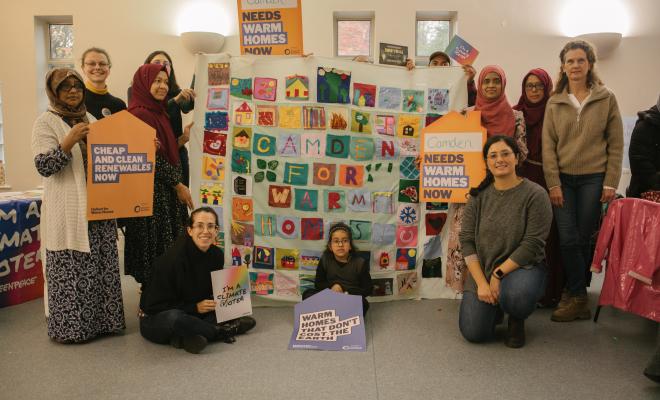17 May 2023
How your email list can help you campaign
To achieve warm homes for all, and secure political support for our campaign goals, we need to be really ambitious about growing people power in communities across England, Wales and Northern Ireland. Only by mobilising large numbers in your constituency will your politician see widespread support and take notice of our demands.
Well-planned emails can be invaluable in activating people on your mailing list, and encouraging them to increase their involvement by offering different opportunities over time. They can also help build your relationship with partner organisations, and help your group reach out even further.
Understanding your email audience
Your mailing list will include people with an interest in your Warm Homes campaign, but their motivations for support, and their circumstances, will vary significantly.
Consider what you already know about them. Where do they live? How did they sign up to your list, for example in response to a petition or open letter? Do they have interesting local connections, perhaps with community groups that might be supportive of your campaign?
To find out more about your audience, you could share a short survey with your email list. Ask them why warm homes matter to them, and how they’d like to support your campaign.
Remember to make your emails relevant and appealing to people who’ll have come to your campaign with different focuses and interests, for example not necessarily environmental ones. If you already have connections with partners, use your email to show how you’re working together.
Plan the journey
By planning ahead and designing your email communications around your campaign, you can identify when and how people on your mailing list can help make your activity even more impactful.
Remember to identify opportunities to join forces with partner organisations, for example co-hosting community events, as this provides an opportunity to reach people from other groups.
Here’s an easy 2-step process to plan your campaign emails:
1. Map out your campaign timeline
Use the United for Warm Homes campaign timeline to create a rough timeline of what activities your group would like to do and when. You might find it useful to break it down by month.
2. Map out your emails
Add email dates to this timeline, scheduled to get the most out of your activities. For example, asking for volunteers to help organise an event likely requires more notice than just inviting people to an event. Then add options for what you want to ask people to do in each email. These options are sometimes referred to as “calls to action”. Offer various calls to action to make your emails more engaging and inclusive. For example, some people may not be able to attend weekday meetings, but they might be happy to share your newsletter.
Top tips for engaging your email list
1. Keep it focused
We’re all busy people, and few of us read the entire content of an email. Keep your emails concise and focused on your priorities. Spell out what role people can play and what difference their contribution will make.
2. Make it relevant
Remember what you know about your audience, including people who currently aren’t active. What Warm Homes updates might interest them, and in what ways might they be comfortable to support the campaign?
3. Celebrate wins and feedback
Include updates on the outcome of your work, for example after an event or when you’ve won support from your MP. These updates are a great opportunity to thank people for their support.
4. Offer various calls to action
Here are some ideas that you could include in your campaign email timeline:
- Sign an open letter. Or share it with 3 people.
- Attend a group meeting. Give people a specific reason to attend, for example a welcome slot for newcomers, a planning session for summer events etc.
- Ask for skills. See if anyone has specific skills that would benefit your campaign, for example advertising, communications and writing, photography, social media, advertising, lobbying or liaising with decision makers.
- Ask for volunteers. This could cover a whole range of activities like finding a venue, liaising with partners, distributing flyers, writing press releases, taking photos, managing social media and so on.
- Join an event. Invite people to community events, public meetings, stalls at a local festival etc.
- Build MP relationships. Ask people to write emails, arrange meetings, invite MPs to group events and so on.
- Conduct research. Ask for suggestions to help you identify useful contacts, for example venues, local businesses etc.
Make calls to action more engaging by starting them with doing words. Here are some example calls to action you could use or adapt:
- SIGN: Add your name to our Warm Homes open letter
- EVENT: Volunteer on our Warm Homes stall at the upcoming eco fair
- FOLLOW: Like and subscribe to our new YouTube channel
- SHARE: Forward this newsletter to your family and friends to help spread the word.


